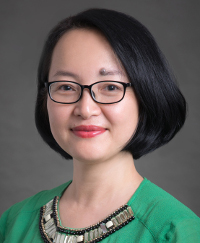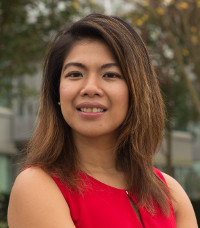AoIR2019 Program
Keynote
Bronwyn Carlson
Macquarie University
Professor Bronwyn Carlson is the Head of the Department of Indigenous Studies at Macquarie University. She is the author of The Politics of Identity: Who Counts as Aboriginal Today? (2016) which includes a chapter on Aboriginal identity and community on social media, and the recipient of two consecutive ARC grants that focus on Indigenous social, cultural and political engagements on social media.
Indigenous Internet users: Learning to trust ourselves
“Trust in the System” is contentious, if not spurious for many Indigenous Internet users. “Trust” signifies as a term that embodies (and disembodies) our experiences from over two hundred years of colonisation. Research has shown that Indigenous people have always been early adopters of technology. Over the last decade or so, social media technologies have gradually become a central part of our everyday lives. It offers opportunities to connect across vast distances and diverse populations. It provides a platform to express one’s identity, connect with community, learn, play, seek love, organise political action, find lost friends and family, search for employment, seek help in times of need—and much more. Almost every aspect of everyday life has in some way been shaped, modified or enhanced by social media technologies. Indigenous people have made particular use of social media for agitating for social justice. Information can be distributed, events coordinated and alliances spontaneously forged across great distances largely outside of the surveillance and control of state actors. Assessing the actual impact of online activism is not a straightforward matter—any concept of ‘trust in the system’ demands that we begin to infiltrate that system in order to force ‘it’ to incorporate the views and experiences of Indigenous actors and activists online.
Plenary Panel: Unpacking ‘Trust in the System’
Popular discourse on the internet has taken quite a turn of late, with earlier, more optimistic buzzwords being replaced by darker ones like ‘surveillance capitalism’, ‘fake news’, and the ‘adpocalypse’; the platforms that mediate our public communication appear to have sold out progressive community values in the chase for engagement metrics and profits. Meanwhile, across all areas of society, processes of datafication and automated decision-making technologies provoke concerns about deepening forms of inequality and injustice. For other stakeholders and observers, these same new technologies are potential mechanisms of improved transparency and trustworthiness. This plenary discussion will unpack the questions of trust, distrust, and trustworthiness in relation to the internet and other emerging socio-technical systems, discuss their political and policy implications, and canvas potential regulatory and governance responses.
 Mark Andrejevic is Professor of Media Studies at Monash University. He writes about surveillance, digital media, and popular culture and is the author of Reality TV: The Work of Being Watched; iSpy: Surveillance and Power in the Digital Era; Infoglut: How Too Much Information is Changing the Way We Think and Know; and the forthcoming (Oct. 2019) Automated Media.
Mark Andrejevic is Professor of Media Studies at Monash University. He writes about surveillance, digital media, and popular culture and is the author of Reality TV: The Work of Being Watched; iSpy: Surveillance and Power in the Digital Era; Infoglut: How Too Much Information is Changing the Way We Think and Know; and the forthcoming (Oct. 2019) Automated Media.
 Yik Chan Chin is Assistant Professor at Xian Jiaotong-Liverpool University’s School of Film and TV Arts. Prior to this, she worked in the University of Nottingham and University of Oxford’s School of Law as a research fellow in media and communication regulation and law,as well as in Hong Kong Baptist University’s Department of Journalism. Her areas of research include media and communication policy, governance, and law with a special focus on China. Currently, she is working on the projects of Internet governance in China, big data ethics in the social media sector, and communication ethics in the artificial Intelligent context.
Yik Chan Chin is Assistant Professor at Xian Jiaotong-Liverpool University’s School of Film and TV Arts. Prior to this, she worked in the University of Nottingham and University of Oxford’s School of Law as a research fellow in media and communication regulation and law,as well as in Hong Kong Baptist University’s Department of Journalism. Her areas of research include media and communication policy, governance, and law with a special focus on China. Currently, she is working on the projects of Internet governance in China, big data ethics in the social media sector, and communication ethics in the artificial Intelligent context.
 Ivana Jurko is a co-founder and Research and Development Manager of Humanitech, a strategic initiative of Australian Red Cross, that explores the opportunities and challenges at the intersection of emerging technologies and humanitarian action. Ivana has over 15 years’ experience in the social sector, and has previously worked at Oxfam Australia, Headspace, and Beyondblue. Her areas of practice include social policy and research, humanitarian futures and foresight, and design and delivery of complex social initiatives. She is currently developing Humanitech’s research program with a particular focus on the social implications of automated decision-making systems.
Ivana Jurko is a co-founder and Research and Development Manager of Humanitech, a strategic initiative of Australian Red Cross, that explores the opportunities and challenges at the intersection of emerging technologies and humanitarian action. Ivana has over 15 years’ experience in the social sector, and has previously worked at Oxfam Australia, Headspace, and Beyondblue. Her areas of practice include social policy and research, humanitarian futures and foresight, and design and delivery of complex social initiatives. She is currently developing Humanitech’s research program with a particular focus on the social implications of automated decision-making systems.
 Aim Sinpeng is a lecturer in the Department of Government and International Relations and co-founder of the Sydney Cyber Security Network at the University of Sydney. Her research focuses on understanding online political engagement in Southeast Asia including issues such as election campaigning, activism, manipulation, disinformation, and hate speech. She is currently working on a Facebook-funded project on tracking hate speech in the Asia Pacific and a manuscript on political campaigning in the age of disinformation in Southeast Asia. Her recent articles appear in the Journal of Technology & Politics, Media, Culture & Society and Pacific Affairs.
Aim Sinpeng is a lecturer in the Department of Government and International Relations and co-founder of the Sydney Cyber Security Network at the University of Sydney. Her research focuses on understanding online political engagement in Southeast Asia including issues such as election campaigning, activism, manipulation, disinformation, and hate speech. She is currently working on a Facebook-funded project on tracking hate speech in the Asia Pacific and a manuscript on political campaigning in the age of disinformation in Southeast Asia. Her recent articles appear in the Journal of Technology & Politics, Media, Culture & Society and Pacific Affairs.



